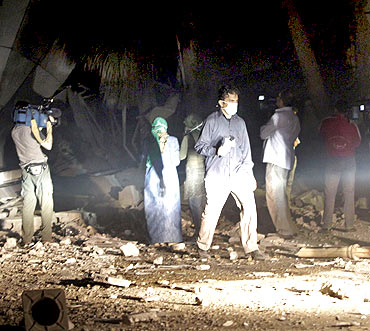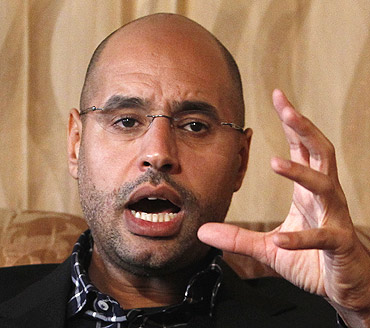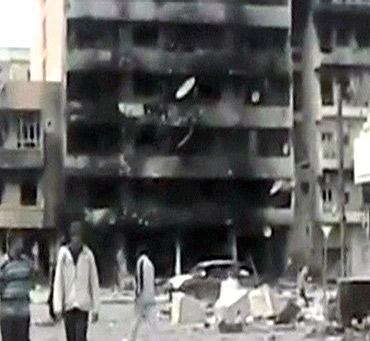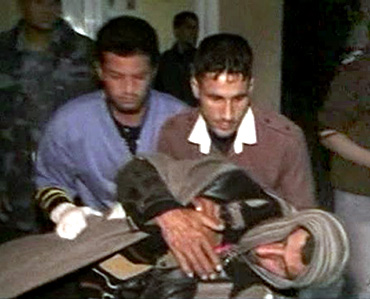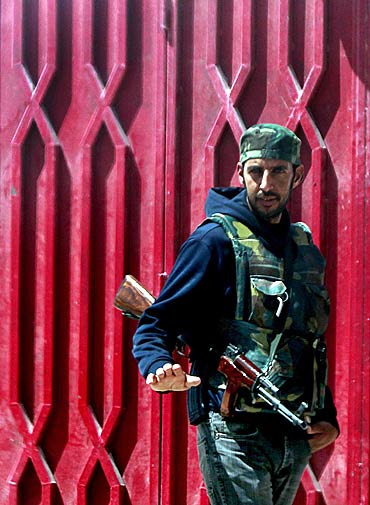 | « Back to article | Print this article |
Libya: Air strike levels Gaddafi's compound
A North Atlantic Treaty Organisation air strike destroyed buildings inside Muammar Gaddafi's office in the capital Tripoli on Monday as forces loyal to the embattled leader pounded western Misurata, despite the regime announcing halt to operations in the besieged city.
In one of the biggest air strikes to hit Tripoli since the western alliance began bombing the Libyan forces on March 19, Gaddafi's sprawling Bab al-Azizia compound was the target of NATO's attack on Monday.
The destroyed buildings appearead to be where Gaddafi held a key meeting with an African Union peace mission on April 10, the BBC said. Reports said Libyan Television and the Jamahiriya and Shababiya TV stations were off air for about half-an-hour following the hit on the sprawling compound by at least two powerful missiles.
Click NEXT to read further...
'The bombing will only scare children'
Media reports quoting a Libyan official said 45 people were wounded, 15 seriously, in the air strikes. The official claimed it was "an attempt to assassinate Gaddafi". On Friday, NATO jets had targeted the Bab al-Aziziya district, where the presidential compound is located.
A defiant Saif al-Islam, the son of the Libyan leader, said the government would not be cowed by such bombardments. "The bombing which targeted Muammar Gaddafi's office... will only scare children. It's impossible that it will make us afraid or give up or raise the white flag," he was quoted as saying by the Jana state news agency.
"You, NATO, are waging a losing battle because you are backed by traitors and spies. History has proved that no state can rely on them to win," Saif said.
Amid the growing humanitarian crisis in the city, forces loyal to Gaddafi pounded Misurata on Sunday even as the Libyan government announced that it halted operations against rebels to facilitate a resolution of the civil war by local tribesmen.
Click NEXT to read further...
'Libyan forces have suspended operations'
At least six people were reported killed in the latest bombardment, which targeted the heart of the city and three residential districts, the BBC said.
Ahead of the bombardments, Libyan Deputy Foreign Minister Khaled Kaim announced the army had halted operations against the rebels, but not withdrawn from Misurata, 215 km east of Tripoli.
"The armed forces have not withdrawn from Misurata. They have simply suspended their operations," Kaim told mediapersons in the capital. But he warned the rebels that armed tribesmen will fight them in place of the army if they refused to surrender in the next two days.
Click NEXT to read further...
'NATO is terrorising people'
Following the targeting of Gaddafi's sprawling Bab al-Azizia compound, supporters of the embattled leader rallied before state television and the visiting journalists. In other places, however, pro-Gaddafi officials appeared more anxious than usual about "the stepped up pace of the bombing attacks", the New York Times said.
They accused "NATO allies of seeking to terrorise the Libyan people," the report said. Senior officials "were already worrying aloud about the safety of their families in places like Surt," the stronghold of Gaddafi that has also been targetted by NATO planes.
Meanwhile rebels, seeking to force 68-year-old Gaddafi out of power after 41-year rule, accused the Libyan regime of "playing games". Jalal el-Gallal, a spokesman for the opposition's Transitional National Council in the rebel-stronghold of Benghazi, also doubted the regime would fully withdraw from Misurata.
"It's a trick," declared Colonel Ahmed Bani, the chief spokesman for the rebel forces in Benghazi. "He is playing deadly games. He can't give up Misurata this easily. He knows that if Misurata falls in our hands, it opens the way for Tripoli to fall in our hands," he was quoted as saying by the Times.
Click NEXT to read further...
'The war is moving towards stalemate'
Anti-Gaddafi forces in Misurata said they had not heard from any tribes while the Libyan regime had continued shelling from the periphery. "It has been a bloody two days," Mohamed, a rebel spokesman said. "There was no pull back. There was defeat and then revenge," he added, referring to the rebels recent success at driving some pro-Gaddafi snipers out of certain buildings which were brought under their control inside Misurata.
"We think the pull back was actually a signal to escalate," he said. Even as pro-Gaddafi forces encircled Misurata, their forces inside the city were themselves surrounded by rebel fighters, BBC said. Amid the fighting, human rights groups have warned of a humanitarian crisis in Misurata.
There is severe shortage of food and medical supplies and thousands of foreign migrant workers remained stranded. Human rights groups have expressed fears that more than 1,000 people have been killed in the fighting there amid looming humanitarian disaster.
Foreign migrants and local civilians were stranded in makeshift camps near Misurata's port, some of them for weeks, an official of the International Committee of the Red Cross said. Amid warnings that the civil war was "moving towards stalemate", France, Italy and Britain have agreed to send military officers to Libya to advise the ragtag rebel forces on technical, logistical and organisational issues.
It comes in the face of recent warning by Admiral Mike Mullen, chairman of the US military's joint chiefs of staff, that the conflict was "moving towards stalemate" even as NATO air strikes had weakened the Libyan forces.
